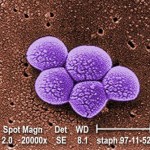Understanding antibiotic-resistant bacteria in pets
 Methicillin-resistant bacteria occur in humans and animals and don’t respond to the usual spectrum of antibiotics, writes veterinarian Mary Ann Crawford. The human culprit, methicillin-resistant Staphylococcus aureus, only occurs in pets as the result of reverse zoonosis, so pets with this bacteria will trigger an investigation into the health of their human companions, Dr. Crawford points out. The methicillin-resistant bacteria of concern in animals is Staphylococcus pseudintermedius, and although it’s unusual, transmission to humans can occur, so gloves, hand-washing and hand sanitizer should be used to prevent transmission, Dr. Crawford notes. The Record (Hackensack, N.J.)
Methicillin-resistant bacteria occur in humans and animals and don’t respond to the usual spectrum of antibiotics, writes veterinarian Mary Ann Crawford. The human culprit, methicillin-resistant Staphylococcus aureus, only occurs in pets as the result of reverse zoonosis, so pets with this bacteria will trigger an investigation into the health of their human companions, Dr. Crawford points out. The methicillin-resistant bacteria of concern in animals is Staphylococcus pseudintermedius, and although it’s unusual, transmission to humans can occur, so gloves, hand-washing and hand sanitizer should be used to prevent transmission, Dr. Crawford notes. The Record (Hackensack, N.J.)
Q. My neighbor’s dog has a wound that is being treated with antibiotics but it is not healing. I have heard lots of information about the bacteria called MRSA being such a terrible thing. Could this be affecting my neighbor’s dog?
MRSA stands for methicillin resistant Staphylococcus aureus. Resistance means that a bacterial infection is not able to be treated effectively by the most commonly used antibiotics. MRSA is a type of bacteria that may affect people but can also be transmitted to animals. It is known as a “reverse zoonosis,” meaning a condition that would travel from a person to an animal, rather than the other way around. When animals have an infection cultured that reveals the MRSA bacteria, we want to question the owners about any infections the people may have in the household.
We do not mean to imply that animals don’t get resistant bacterial infections, because they do, although it is not common. The Staph bacteria affecting animals is called Staphylococcus pseudintermedius (SP), rather than Staphylococcus aureus (SA). There is a methicillin resistant form called MRSP. It is an easily transmissible bacteria from animal to animal, and gloves should be worn when treating any open wounds or known areas of infection. It would be very rare for a person to acquire an infection of MRSP, but anytime there is an open wound present either in an animal or person, the area should only be touched with gloves. Hands should also be cleaned with soap and water after being in contact with the dog or person, followed by an alcohol based disinfectant such as Purell.
We identify bacterial infections by obtaining a sample of the infected area and sending it to a laboratory for identification (culturing). The laboratory also provides us information about which antibiotics the bacteria are susceptible to. The laboratory informs us if the bacteria are a resistant strain such as MRSA or MRSP, and this helps guide our treatment recommendations for therapy. Since the wound has not been responding, your neighbor should consider returning to their veterinarian where they will likely consider culturing the infected area.
— Mary Ann Crawford, DVM

